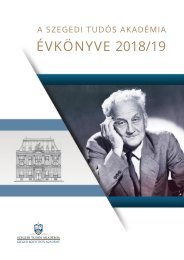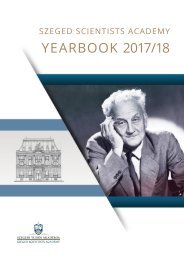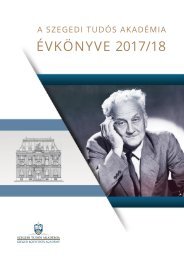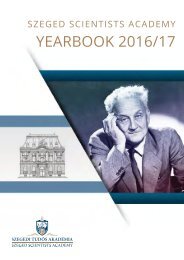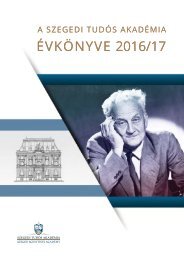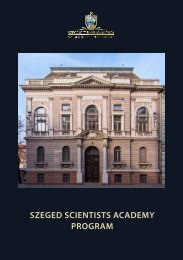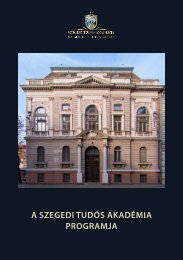Create successful ePaper yourself
Turn your PDF publications into a flip-book with our unique Google optimized e-Paper software.
SZENT-GYÖRGYI STUDENTS<br />
DÁVID TÓTH<br />
Szeged Scientists Academy, 4 th year<br />
University of Szeged,<br />
Faculty of Medicine, 4 th year<br />
YEAR OF BIRTH:<br />
<strong>19</strong>96<br />
FORMER<br />
SZENT-GYÖRGYI<br />
PUPIL:<br />
no<br />
SZENT-GYÖRGYI<br />
MENTOR:<br />
Gábor Juhász<br />
JUNIOR MENTOR:<br />
Gábor Horváth<br />
SPECIALIZATION:<br />
DNA repair genes,<br />
autophagy regulation<br />
SECONDARY<br />
SCHOOL:<br />
Táncsics Mihály Secondary<br />
School, Orosháza<br />
NAME OF TEACHER:<br />
László Francziszti, László<br />
Kiss<br />
IMPORTANCE, AIMS AND POSSIBLE OUTCOME OF RESEARCH<br />
Numerous endogenous and exogenous agents can cause DNA damage, which may lead<br />
to deleterious consequences. The response to DNA damage is the activation of DNA<br />
damage sensing proteins and DNA repair mechanisms. DNA repair mechanisms and<br />
DNA damage tolerance are required for the correction of DNA damage occurring during<br />
normal cellular life or due to physical or chemical agents. Autophagy is responsible for<br />
the breakdown and recycling of damaged cellular components. There are evidences that<br />
the two processes are connected, and they can regulate each other. In MCF-7 cells BRCA1<br />
negatively regulates autophagosome formation and lysosomal acidification and different<br />
Fanconi anaemia proteins may play role in the mitophagy regulation. But they didn’t<br />
figure out the exact regulatory mechanisms…<br />
In the scope of our work we attempt to evaluate the role of selected DNA repair genes in<br />
the regulation of autophagy in human cell culture with molecular biology and microscopy<br />
based methods.<br />
AMBITIONS AND CAREER GOALS<br />
My principal goal is to master genetics at the highest level possible and to impart my<br />
knowledge to others. I also intend to expand my expertise by working in leading research<br />
labs abroad. Also I would like to use my genetics knowledge in the medical oncology field.<br />
HONORS AND PRIZES<br />
• 2016 Autumn: University of Szeged Faculty of Medicine - Scientific Student Conference<br />
1 st prize<br />
• 2017. – XXXIII. National Scientific Student Conference 2 nd prize<br />
PUBLICATIONS<br />
Kiss, V., Jipa, A., Varga, K., Takáts, Sz., Maruzs, T., Lőrincz, P., Simon-Vecsei, Zs., Szikora, Sz.,<br />
Földi, I., Bajusz, Cs., Tóth, D., Vilmos, P., Gáspár, I., Ronchi, P., Mihály, J; Juhász, G. Drosophila<br />
Atg9 regulates the actin cytoskeleton via interactions with profilin and Ena. (under review)<br />
LANGUAGES:<br />
English/intermediate<br />
German/advanced<br />
128






